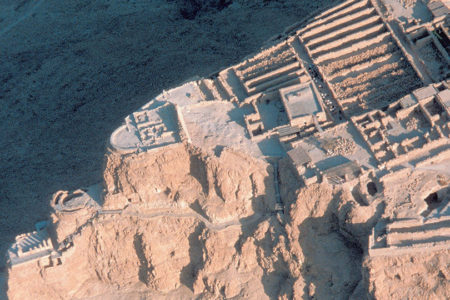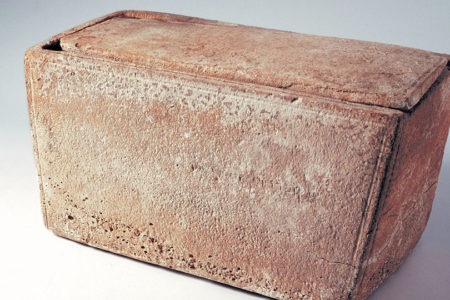Adonai
The children of Israel were ready to cross into the land of promise! The trip had been long—thirty-eight years longer than it might have been had their forebears believed God (Num. 14:33). The generation that had gone before them—that had departed Egypt after witnessing the most remarkable miracles any people had seen and yet refused to trust God—was lying dead in the wilderness; God had answered its rash, rebellious prayer (Num. 14:2).
Now a new generation, anxious to trust the God who had promised this land to them (Gen. 15:18), was commanded to prepare for the final stage of the journey, the trip across the swollen Jordan River and into the land of Canaan. But the swirling waters were not the most terrifying reality these Israelites faced. More frightening still was this sobering fact: Moses was dead. He had been buried by the hand of Yahweh Himself (Dt. 34:5–6). And this generation had never known any other divinely appointed, empowered representative.
How would the God of Israel now prove that He could accomplish His purposes through Joshua?
Lord of All the Earth
The command went forth for the nation to watch as the priests carried the Ark of the Covenant—the sacred, ornate box that functioned as the very throne of King Yahweh—to the edge of the Jordan River. At the moment the priests’ feet touched those roiling waters, the Jordan parted, as had the Red Sea some forty years earlier; and the priests led the nation through on dry land.
As that marvelous trek commenced, Joshua shouted, “Behold, the ark of the covenant of the Lord of all the earth passeth over before you into the Jordan” (Josh. 3:11). With that miracle—which so unmistakably resembled Moses’ parting of the Red Sea forty years earlier—Yahweh “magnified Joshua in the sight of all Israel,” so the nation feared and followed Joshua just as it had Moses (Josh. 4:14).
In that regal announcement, made at that dramatic moment, Joshua referred to King Yahweh as “the Lord of all the earth.” Yahweh is not simply some local tribal deity, unable to move among any people but His own, powerless before the Canaanite gods, or susceptible only to Moses’ manipulations. Yahweh is Lord of all the earth! He will rule in the affairs of the inhabitants of Canaan despite their wicked unbelief. And He will empower and lead Joshua just as He had Moses.
Meaning and Usage
The word Lord in Joshua 3:11 is the Hebrew title Adonai, one of the more important names of God in the Old Testament. In that culture, “a name was chosen very carefully, and with attention to its significance” because “the Hebrews considered the name an embodiment of the person bearing it” (cf. Ex. 3:13–15).1 In fact, the name by which a biblical person is known not only describes that person; it “indicates the essential character of that to which the name is given.”2
Thus the various names of God are important elements of His revelation of Himself to mankind. Indeed, “one of the most theologically significant modes of the divine self-disclosure is the revelation inherent in the names of God.”3 There is much to be learned from a careful consideration of this particular name of God, Adonai.
Adonai is usually traced to an Ugaritic root that means “lord” or “father.”4 There is no question as to the meaning of this term throughout the Old Testament. Much more important, however, is the way the term is used. Throughout Scripture, whether used in reference to men or God, the term means “lord” or “master.” It is used more than two hundred times to refer to a superior rather than to God, but even then it always refers to one of higher rank than the speaker.5
For instance, Sarah spoke of her husband as Adonai(Gen. 18:12). Lot used the term of angelic visitors (Gen. 19:2); and the title is applied to the pharaoh of Egypt (Gen. 40:1), Joseph as the administrator of Pharaoh’s wealth (Gen. 42:10), Boaz by Ruth before they are wed (Ruth 2:13), Eli the high priest (1 Sam. 1:15), Elijah as the prophet of God (1 Ki. 18:7), and Shemer as the “owner” of the hill of Samaria (1 Ki. 16:24).
By the same token, the word always retains the primary sense of “lord” when applied to God.6 The term is used of God more than three hundred times in the Old Testament, though the usages are concentrated in the Psalter (more than fifty times), Isaiah (forty-seven times), Jeremiah (twenty-nine times), Ezekiel (more than 150 times), and Amos (twenty-seven times). When the term consistently refers to God, it is plural; but that construction should be regarded as the “plural of majesty,”7 which only intensifies the sense of God’s control or sovereignty as “Lord of all the earth.”
God as Adonai in the Old Testament
Adonai is used as a divine title for the first time in Genesis 15:2 and 8, where Abram petitioned God using the compound title “Lord [Adonai] GOD [Yahweh].” The patriarch asked God for an heir so that he might realize the promise of a great family. Abraham profoundly sensed his own helplessness and realized the absolute authority and infinite ability of the One to whom he had come. Thus he came to God as a servant comes to his master, as a slave to his owner, and as a beggar to his benefactor.
All of these connotations reside in the title Adonaias it is used throughout the Old Testament. Compare, for instance, the sense of desperate need in Gideon’s prayer: “O my Lord [Hebrew, Adonai], wherewith shall I save Israel? Behold, my family is poor in Manasseh, and I am the least in my father’s house” (Jud. 6:15). Again, consider Yahweh’s majestic pronouncement concerning the evil machinations of pagan kings against the throne of David: “Thus saith the Lord [Hebrew, Adonai] GOD, It shall not stand, neither shall it come to pass” (Isa. 7:7). And again, note the contempt with which the Sovereign of human history regards men who set themselves against Him and His anointed: “He who sitteth in the heavens shall laugh; the Lord [Hebrew, Adonai] shall have them in derision” (Ps. 2:4).
This One is the true God, Lord of all the earth. He has made Himself known as Adonai, a term that bespeaks universal ownership and absolute lordship on His part and that demands submission and obedience on our part. Thus He demands and deserves to be honored as truly Lord over all we have and all we are.
But equally as important, He has proven Himself a Lord who can be trusted to do what is best for those who serve Him with a happy heart. Thus the testimony of David: “In thee, O LORD [Hebrew, Yahweh], do I hope; thou wilt hear, O Lord [Hebrew, Adonai] my God [Hebrew, Elohim]” (Ps. 38:15).
God as Adonai in Our Lives
The biblical reality that God is Adonai—truly and legitimately Lord and Master of all—is at once an interminable frustration and an unspeakable delight. To one who is yet in his sin, such truth is a frustration. The essence of sin is selfishness, the determination to put oneself at the center of one’s own little universe, to live for self-satisfaction and self-aggrandizement. Thus people who are yet in the grip of sin will insist they ought to rule over their own lives. God’s claims on them will be an offense. The great nineteenth-century English preacher Charles Haddon Spurgeon described this spirit of rebellion in compelling fashion:
Men will allow God to be everywhere except on His throne. They will allow Him to be in His workshop to fashion worlds and make stars. They will allow Him to be in His almonry to dispense His alms and bestow His bounties. They will allow Him to sustain the earth and bear up the pillars thereof, or light the lamps of heaven, or rule the waves of the ever-moving ocean; but when God ascends His throne, His creatures then gnash their teeth.8
But individuals who have come to God for the forgiveness He has provided in His Son, who have bowed their knees to the claims of God as Creator and Redeemer, have found Him to be benevolent indeed. Consider, for instance, the testimony of King David in Psalm 57. In his moment of desperation while fleeing Saul, David willingly cried out, “Be thou exalted, O God, above the heavens; let thy glory be above all the earth” (v. 5).
And because it was the impulse and determination of David’s heart to exalt his God—because he had acknowledged God as Adonai in his life—this sweet singer was able to rejoice later in that same song: “I will praise thee, O Lord [Hebrew, Adonai], among the peoples; I will sing unto thee among the nations. For thy mercy is great unto the heavens, and thy truth unto the clouds” (vv. 9–10). And thus did David close that song with the repeated refrain, “Be thou exalted, O God, above the heavens; let thy glory be above all the earth” (v. 11).
ENDNOTES
- Walter Eichrodt, Theology of the Old Testament (Philadelphia: Westminster, 1967), 2:40–45, cited by Millard J. Erickson, Christian Theology, 2d ed. (Grand Rapids: Baker, 1998), 296.
- Gerard Van Groningen, “God, Names of,” Baker Encyclopedia of the Bible (Grand Rapids: Baker, 1988), 1:880.
- E. McComiskey, “God, Names of,” Evangelical Dictionary of Theology (Grand Rapids: Baker, 1984), 464.
- Robert L. Alden, “adon,” Theological Wordbook of the Old Testament (Chicago: Moody Press, 1980), 1:12 (hereafter cited as TWOT).
- McComiskey, 467.
- The Hebrew form differs when it refers to man compared to when it refers to God. Alden (TWOT, 1:12–13) stated, when the term has no suffix (adon) “or when pointed for the first common singular suffix or with other pronominal suffixes,” the term refers to men. (Exceptions, however, are Exodus 34:23; Deuteronomy 10:17; and Psalm 8:1). But when the term is plural with a first common singular pronominal suffix, it always refers to God.
- Alden, TWOT, 1:13, stated, “Just as elohim(God) is plural in Hebrew, so this word might also be called an intensive plural or plural of majesty.” This linguistic artifice, common in Hebrew, pluralizes a singular entity to heighten its importance.
- Charles Haddon Spurgeon, cited in Arthur W. Pink, The Attributes of God (Grand Rapids: Baker, 1975), 32–33.







